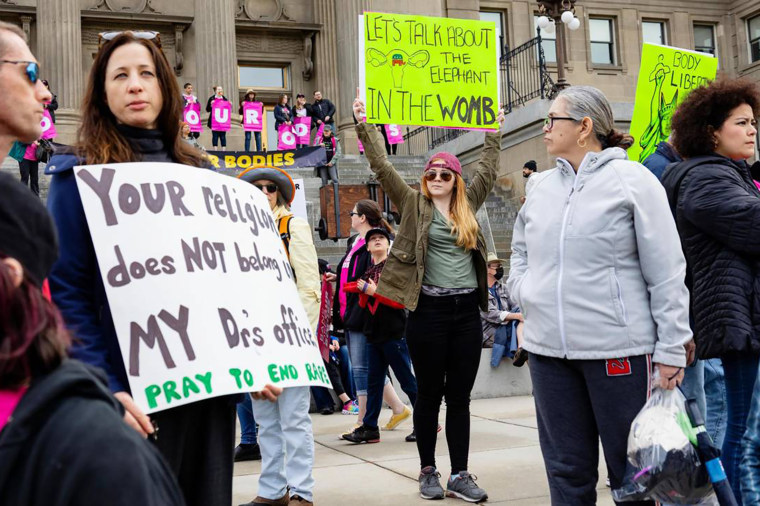The Summary
- Four women are suing the state of Idaho after they were denied abortions for fatal fetal abnormalities.
- The lawsuit seeks to clarify the medical exemptions to Idaho’s strict abortion laws.
- The plaintiffs will testify about their experiences in court on Tuesday and Wednesday.
Four women who are suing the state of Idaho after they were denied abortions will testify on Tuesday and Wednesday about their experiences traveling out of state to end nonviable pregnancies.
The lawsuit at the center of the upcoming trial in Ada County District Court seeks to clarify the medical exemptions to Idaho’s strict abortion laws. The plaintiffs are the Idaho Academy of Family Physicians, two physicians and the four women testifying this week, who learned while pregnant that their fetuses were unlikely to survive.
The suit, filed last year, argues that the woman suffered “unimaginable tragedy and health risks due to Idaho’s abortion bans,” and that Idaho doctors lack sufficient guidance about when they can perform the procedure without risking jail time.
Idaho has two laws restricting abortion: Under the most stringent, it is a felony to terminate a pregnancy at any stage, with limited exceptions, and providers who violate the law face two to five years in prison. A second law allows private citizens to sue health care providers who perform abortions after six weeks of pregnancy. Neither policy makes an exception for fatal fetal abnormalities, which is a focus of the lawsuit.
“We’re not trying to tell Idaho how it has to write its laws. We’re just saying that the laws as written are not working,” said Nick Kabat, an attorney with the Center for Reproductive Rights who is representing the plaintiffs.
Idaho Gov. Brad Little and Idaho Attorney General Raúl Labrador are defendants in the lawsuit. Labrador’s office declined to comment, and Little’s office did not respond to requests for comment.
The Idaho case is similar to Zurawski v. Texas, a suit that the Center for Reproductive Rights filed last year. In May, the Texas Supreme Court ruled against the 20 plaintiffs, who were denied abortions in the state despite dangerous pregnancy complications.
Kabat said he’s optimistic about getting a different outcome this time, because “in Texas, we didn’t get to go to trial.”
Rebecca Vincen-Brown, a plaintiff who lives in Ada County, Idaho, said she’s similarly hopeful.
Vincen-Brown learned last year, at 16 weeks of pregnancy, that her fetus had several abnormalities — among them, a compromised airway, a missing bladder and a heart and brain that weren’t properly developed. DNA testing later revealed that the fetus had a rare chromosomal condition called triploidy. Her doctor told her the pregnancy wasn’t viable, and she would likely miscarry or have a stillbirth.
“In no world were we going to have a living baby at the end,” Vincen-Brown said.
She and her husband decided to end the pregnancy at 17 weeks to avoid endangering her health or fertility. Because that was not permitted in Idaho, they drove seven hours to Portland, Oregon. After the first day of the two-day procedure, Vincen-Brown passed the fetus in the hotel bathroom at around 4 a.m., with her 2-year-old daughter in the other room.
“Deciding to have the abortion was probably the hardest decision of our life, but the trauma that came with it when we went to Portland was completely unnecessary and could have been 100% preventable,” she said.

The lawsuit alleges that Idaho’s laws violate pregnant people’s rights to safety and equal protection, as well as physicians’ rights to practice medicine under the state constitution. It asks the court to declare that physicians in Idaho can provide abortion care in three specific scenarios:
- A pregnant person has a medical complication that makes it unsafe to continue a pregnancy or poses a risk of infection or bleeding.
- A pregnant person has an underlying medical condition that is made worse by pregnancy, cannot be treated effectively or requires recurrent, invasive intervention.
- A fetus is unlikely to survive the pregnancy or birth.
The trial comes on the heels of an election in which abortion was a key issue and seven states passed measures to protect it, including two (Missouri and Arizona) that reversed existing bans. The case is one of many ongoing legal challenges to abortion bans. The Wisconsin Supreme Court heard arguments Monday about whether the state can enforce an 1849 abortion ban.
In April, the U.S. Supreme Court heard arguments in another case challenging Idaho’s total abortion ban — that lawsuit alleged that the state law violated federal policy mandating certain standards for emergency care. The justices dismissed the case in June, sending it back to an appeals court.
Idaho’s two abortion bans took effect in August 2022, roughly two months after the Supreme Court overturned Roe v. Wade. The state’s six-week restriction makes exceptions for rape, incest and to save a pregnant woman’s life or prevent “substantial and irreversible impairment of a major bodily function.” The full ban, meanwhile, makes exceptions for physicians who decide an abortion is necessary to save a pregnant woman’s life, and for cases of rape and incest. However, abortions in those cases must be completed in the first trimester and the pregnant person must report the incident to law enforcement.
Yet another Idaho law makes it a crime to help a pregnant minor travel out of state for an abortion, but that one has been temporarily blocked by a federal judge.
Kabat said that his legal team intends to argue in the trial this week that Idaho’s abortion bans will lead to deaths if the exceptions aren’t clarified further. Such deaths are nearly impossible to track, however, because the state declined to renew its Maternal Mortality Review Committee, which investigated pregnancy-related deaths, so it expired in July 2023.
“It may be the case that someone has died in Idaho, but there was no one there to really evaluate that death,” Kabat said.






